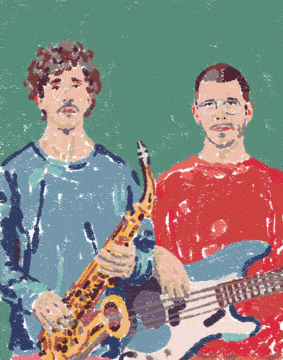Kelefa Sanneh at The New Yorker:
 Wilkes, who is thirty-one, grew up in Connecticut, and Gendel, who is thirty-five, grew up in central California. Both were drawn to Los Angeles by way of the jazz program at the University of Southern California. They turned out to have mixed feelings about studying jazz in a university setting. And maybe they had mixed feelings, too, about being tied to a tradition that arouses as much strong feeling—and, worse, as much weak feeling—as jazz does. As a boy, Wilkes was obsessed with the Grateful Dead and Phish, which gave him a love of improvisation. By the time he applied to U.S.C., he was a proficient electric-bass player, and, although he knew that the jazz program typically accepted only upright-bass players, he figured that the jazz bureaucracy might make an exception for him. It did not, and so he studied R. & B. and funk instead, working with a string of legendary musicians, including Patrice Rushen, an esteemed composer and keyboardist, and Leon (Ndugu) Chancler, a drum virtuoso. This was not a sad story: it turned out that Wilkes loved session playing, which demands precision and adaptability, and he had no complaints about his college experience. But, as Wilkes talked in the studio, Gendel grew outraged on his behalf—he couldn’t abide the idea that a jazz department would reject an eager student just because he played the wrong instrument. “It’s the most anti-jazz, anti-open-minded mentality I can imagine,” he said, becoming more animated than he’d been all afternoon. “This is why I’m against it all. It’s just stupid!”
Wilkes, who is thirty-one, grew up in Connecticut, and Gendel, who is thirty-five, grew up in central California. Both were drawn to Los Angeles by way of the jazz program at the University of Southern California. They turned out to have mixed feelings about studying jazz in a university setting. And maybe they had mixed feelings, too, about being tied to a tradition that arouses as much strong feeling—and, worse, as much weak feeling—as jazz does. As a boy, Wilkes was obsessed with the Grateful Dead and Phish, which gave him a love of improvisation. By the time he applied to U.S.C., he was a proficient electric-bass player, and, although he knew that the jazz program typically accepted only upright-bass players, he figured that the jazz bureaucracy might make an exception for him. It did not, and so he studied R. & B. and funk instead, working with a string of legendary musicians, including Patrice Rushen, an esteemed composer and keyboardist, and Leon (Ndugu) Chancler, a drum virtuoso. This was not a sad story: it turned out that Wilkes loved session playing, which demands precision and adaptability, and he had no complaints about his college experience. But, as Wilkes talked in the studio, Gendel grew outraged on his behalf—he couldn’t abide the idea that a jazz department would reject an eager student just because he played the wrong instrument. “It’s the most anti-jazz, anti-open-minded mentality I can imagine,” he said, becoming more animated than he’d been all afternoon. “This is why I’m against it all. It’s just stupid!”
more here.
